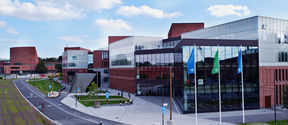How to use artificial intelligence to augment multidisciplinary education

Students today need to apply their skills creatively to new situations in an ever-changing, complex and global knowledge economy. Traditional fields, such as marine technology, require increasingly multidisciplinary competencies and dynamic capabilities. Designing courses and coordinating educational activities that achieve this is a difficult and time-consuming process.
‘We need to collaborate with many professors in different domains and also consider the needs of the industry’ says Jani Romanoff, Associate Professor of Marine Technology.
‘The collaborative process easily takes many weeks given the fragmentation between personnel and difficulties in identifying relevant topics across domains.’
In order to ease such collaboration, Aalto University IT Services organised a pilot project that applied semantic matching technology to link professors, courses and industry needs. Semantic matching utilises machine learning algorithms and Natural Language Processing (NLP) technology to process and make sense of masses of texts. This allows for the semantic profiling of professors, based on data mining of their accumulated research outputs on research.aalto.fi. The same enabling technology also allows for semantic modelling of courses and students (based on course data respectively), so that multilateral linking, clustering and matching can be done automatically.
Cross-domain professor search and course recommendations
The pilot project included two experiments with semantic matching. The first one was to identify professors across Aalto to collaborate on a FITech Summer Boost course on designing autonomous ships. Such a topic requires expertise from multiple fields, thus presenting the need to find the right people to collaborate on teaching the course. This was done by using the public data on research.aalto.fi, calculating the similarity between each publication and the given keywords and finally ranking the researchers by how many relevant publications they had. What would otherwise have posed a laborious manual task was quickly accomplished with the help of semantic matching. Following this, the same matching technology was used for targeting the course towards specific students based on their course histories.
To start, the FITech Summer Boost course themes, described with keywords, were matched with the public Aalto course data. Relevant courses were looked up from a dataset of student course history. Finally, students were ranked based on the number of relevant courses they had taken and the time of when they had taken them and then approached through email. In order to ensure privacy, the dataset used for matching was pseudonymised so that no single student could be identified from the data.
Again, the semantic matching quickly produced a good set of students that might be interested in the course, in a way that is similar to how Netflix might recommend content to its users.
‘This kind of targeted course marketing is important, because other methods simply do not work,’ stated professor Romanoff, who was in charge of the FITech Summer Boost course.
'The novelty of the technology is that the algorithmic recommendation considers the transferable topics across domains, even if different words and terminologies are used' says Vincent Kuo, the CEO of VXT Research Ltd, which conducted the semantic matching experiments.
For instance, the artificial intelligence can identify the relevance of 'accident modelling', 'fire', and 'risk analysis' with respect to 'marine safety'. Silos separated by different contextual language or jargons can therefore be bridged, through which data can be interoperable and internal collaboration can be facilitated.
Enabling an ecosystem of lifelong learning
The pilot revealed a possibility to build a collaboration ecosystem on the foundation of university data and semantic matching technology. However, it also revealed that in order to drive such an ecosystem, strong data governance is needed for all university functions and processes.
‘Beside validating the feasible utilisation of machine learning on university data, such demonstrations also drive many important discussions on the future of data governance at Aalto’ says Martti Rahkila, Development Manager at Aalto University IT Services.
‘Could institutional data be made more accessible to enable third-party applications and advanced algorithms to augment education, assist recruitment or even facilitate lifelong learning?’
There are many practices that still need to be established before impactful developments can be achieved consistently in the ecosystem view. Nevertheless, the pilot sets the stage for realising such visions in the future, the first small steps of many to come on the long journey.
Contact information:
Martti Rahkila
Development Manager at Aalto University IT Services CDO Office
[email protected]
+358 50 576 1175
Vincent Kuo
CEO and Co-founder at VXT Research Oy
[email protected]
+358 44 954 1094
Read more news

DeployAI Partners Gather for Heart Beat Meeting in Helsinki
The European DeployAI project's partners gathered for the Heart Beat meeting hosted by Aalto University Executive Education in Helsinki.
Professor appointments at the School of Business
Prottoy Akbar, Pablo Warnes, Erkki Vihriälä and Christoph Huber will start in their new positions on 1 August 2024.